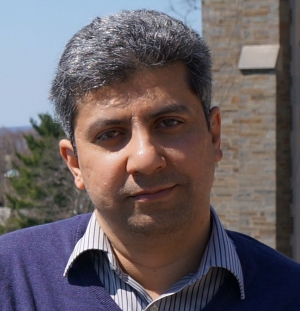-
ECE Seminar: Distributed Systems: Rigorous Theoretical Foundations Unlock Promising Gains

Fri, Mar 25, 2022 @ 10:00 AM - 11:00 AM
Ming Hsieh Department of Electrical and Computer Engineering
Conferences, Lectures, & Seminars
Speaker: Dr. Mohammad Ali Maddah-Ali, Research Scientist, Department of Electrical Engineering, Stanford University
Talk Title: Distributed Systems: Rigorous Theoretical Foundations Unlock Promising Gains
Abstract: Over the last twenty years, we have witnessed several revolutionary technologies, from communication networks to learning platforms to blockchains, that have profoundly changed our daily lives. Often, these platforms are modeled, designed, and operated based on intuition and folk wisdom. In this talk, we challenge some of those common beliefs. We show that by meticulously elaborating the key performance bottlenecks from first principles, we can propose counterintuitive solutions grounded in rigorous analysis that unlock considerable scaling gains in several areas:
1) In wireless communications, the delay in acquiring channel information is a significant bottleneck in supporting multiple users at a time. Contrary to popular belief, we demonstrate that even completely outdated channel information can be used for interference management and enabling simultaneous communications, thus alleviating the bottleneck of channel training.
2) In content delivery networks, folk wisdom design is to maximize the likelihood of serving a request from the local cache (hit rate); thus, the performance is bottlenecked by the size of an individual cache. We propose a fundamentally new approach with a gain that scales with the sum of the cache sizes in the network, rather than an individual cache size.
3) In distributed learning, we demonstrate that training with combined data samples (i.e., erasure-coded samples), rather than raw samples, can significantly improve the reliability and convergence rate. Moreover, we highlight the surprising role of approximation theory in circumventing a major bottleneck in designing practical coded training procedures.
We conclude with promising directions for further investigation: in particular, the challenges in adding decentralized trust and accountability to these systems, to place control over them back in the hands of individuals rather than big corporations.
Biography: Mohammad Ali Maddah-Ali received the B.Sc. degree from the Isfahan University of Technology, the M.Sc. degree from the University of Tehran, and the Ph.D. degree from the Department of Electrical and Computer Engineering, University of Waterloo, Canada. From 2008 to 2010, he was a Postdoctoral Fellow in the Department of Electrical Engineering and Computer Sciences, University of California at Berkeley. From 2010 to 2020, he was working at Bell Labs, Holmdel, NJ, as a communication network research scientist. He also worked as a faculty member at the Department of Electrical Engineering, Sharif University of Technology. Currently, he is a research scientist at the Department of Electrical Engineering, Stanford University.
Dr. Maddah-Ali is a recipient of several awards including the IEEE International Conference on Communications (ICC) Best Paper Award in 2014, the IEEE Communications Society and IEEE Information Theory Society Joint Paper Award in 2015, and the IEEE Information Theory Society Paper Award in 2016. He is currently serving as an associate editor for the IEEE Transactions on Information Theory and a lead editor for The IEEE Journal on Selected Areas in Information Theory.
Host: Dr. Keith Chugg, chugg@usc.edu
Webcast: https://usc.zoom.us/j/98149159985?pwd=cWFsVnRkZXRKcTlWYllMcy9Rempmdz09Location: Hughes Aircraft Electrical Engineering Center (EEB) - 248
WebCast Link: https://usc.zoom.us/j/98149159985?pwd=cWFsVnRkZXRKcTlWYllMcy9Rempmdz09
Audiences: Everyone Is Invited
Contact: Mayumi Thrasher
This event is open to all eligible individuals. USC Viterbi operates all of its activities consistent with the University's Notice of Non-Discrimination. Eligibility is not determined based on race, sex, ethnicity, sexual orientation, or any other prohibited factor.




